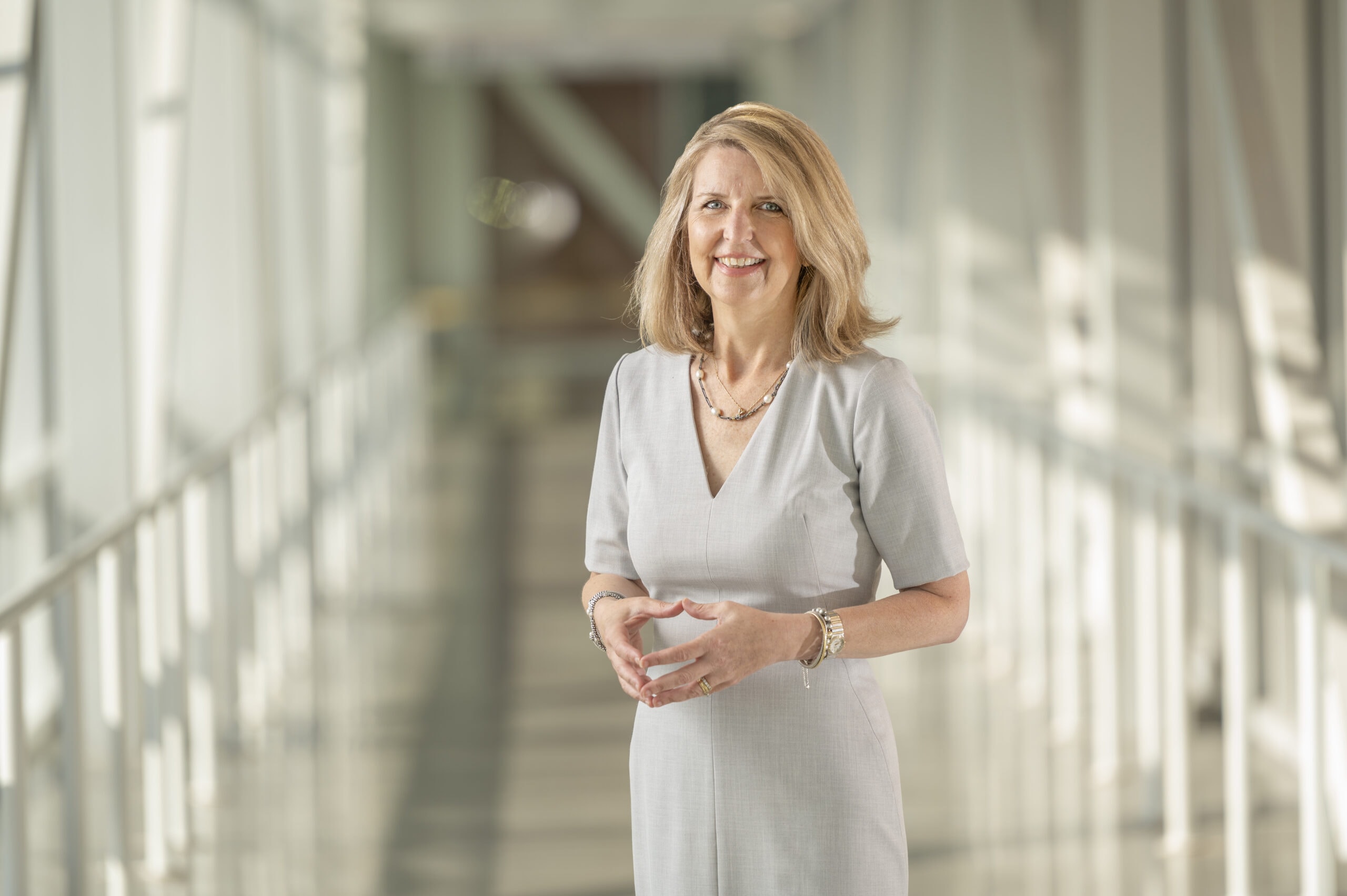View Larger Image

Susan Smyth, M.D., Ph.D., died Dec. 31, 2022, after a battle with cancer.
Image by Evan Lewis
UAMS Mourns Loss of Susan Smyth, M.D., Ph.D.
| LITTLE ROCK — The University of Arkansas for Medical Sciences (UAMS) is sad to announce that Susan Smyth, M.D., Ph.D. executive vice chancellor and dean of the College of Medicine, died Dec. 31, 2022, after a battle with cancer.

Susan Smyth, M.D., discuss cardiology cases with clinical team members. (From left) Divya Nayar, M.D., neurology resident; Abdallah Malkawi, M.D. cardiovascular medicine fellow; and Tushar Tarun, M.D., assistant professor, cardiovascular medicine.Bryan Clifton
“Susan was a remarkable leader, colleague and friend who will be deeply missed by many across our state, especially those of us fortunate enough to work with her,” wrote Chancellor Cam Patterson, M.D., MBA, in an announcement to UAMS employees and students. “Her death is a great loss for UAMS, our state and all who knew her.”
She is survived by her husband, Andrew Morris, Ph.D., professor in the UAMS Department of Pharmacology and Toxicology, and their sons, Edward and William.
Smyth was a nationally respected cardiologist and translational researcher who joined UAMS in 2021 from the University of Kentucky, where she was chief of the Division of Cardiovascular Medicine and director of the Gill Heart and Vascular Institute. She also served as a cardiologist and funded investigator for the VA Health Care System. She was a member of the American Society for Clinical Investigation, past president of the Association of University Cardiologists and served on the CTSA Steering Committee for the National Center for Advancing Translational Science. Smyth authored more than 200 publications and contributed to over a dozen textbooks.
She graduated from Mount Holyoke College in South Hadley, Mass., with a Bachelor of Arts in biology before earning both a medical degree and a Ph.D. in pharmacology from the University of North Carolina in Chapel Hill. She completed an internal medicine residency, including a year as chief resident, at University Medical Center in Stony Brook, New York, and cardiology fellowships at Mount Sinai Medical School in New York and the University of North Carolina, where she joined the faculty in 2001.
After joining UAMS, Smyth launched and expanded numerous initiatives to improve health in Arkansas while also increasing the College of Medicine’s national standings in primary care and other aspects of education, research and clinical care. She made the pursuit of health equity, diversity and inclusion a top priority for the college. Her funded research focused on the interplay between inflammation and thrombosis in vascular biology. In November, she was invested at UAMS in the Arkansas Medical Society Distinguished Dean’s Chair during a ceremony in which her husband Andrew also was invested in the Mehta Stebbins Chair in Cardiovascular Research.
UAMS has appointed G. Richard Smith, M.D., former dean of the College of Medicine and founding director of the UAMS Psychiatric Research Institute, to serve as interim dean.
UAMS is the state’s only health sciences university, with colleges of Medicine, Nursing, Pharmacy, Health Professions and Public Health; a graduate school; a hospital; a main campus in Little Rock; a Northwest Arkansas regional campus in Fayetteville; a statewide network of regional campuses; and eight institutes: the Winthrop P. Rockefeller Cancer Institute, Jackson T. Stephens Spine & Neurosciences Institute, Harvey & Bernice Jones Eye Institute, Psychiatric Research Institute, Donald W. Reynolds Institute on Aging, Translational Research Institute, Institute for Digital Health & Innovation and the Institute for Community Health Innovation. UAMS includes UAMS Health, a statewide health system that encompasses all of UAMS’ clinical enterprise. UAMS is the only adult Level 1 trauma center in the state. UAMS has 3,275 students, 890 medical residents and fellows, and five dental residents. It is the state’s largest public employer with more than 12,000 employees, including 1,200 physicians who provide care to patients at UAMS, its regional campuses, Arkansas Children’s, the VA Medical Center and Baptist Health. Visit www.uams.edu or uamshealth.com. Find us on Facebook, X (formerly Twitter), YouTube or Instagram.###